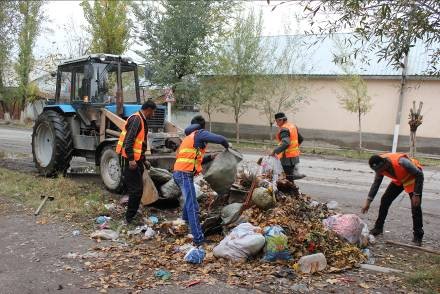
May 2015—In the Kyrgyz Republic, one of the poorest former Soviet republics, people face many social and economic problems. The most dire circumstances are found in remote mountainous regions of the country. However, lack of finance is not always the main challenge.
Sometimes people lack knowledge, experience and confidence that they can solve their problems by themselves.
In 2012, USAID and the Eurasia Foundation of Central Asia launched the Local Transparency and Cooperation Initiative to improve the quality of public and municipal services and communication between citizens and local government. Through training, community meetings, public hearings and legal consultations, local residents learned about their rights to receive certain municipal services. They also learned to assess and prioritize the needs of their communities and find effective ways to address them. At the same time, local authorities learned ways to better collaborate with their community members and to unlock community resources to solve larger problems than allowed by a limited local budget.
One of the most serious problems that people face in remote regions of the Kyrgyz Republic is access to clean drinking water.
The village of Avletim in the Jalal-Abad region is home to over 3,000 people. The water pipeline was dilapidated and local authorities could not afford to repair it. Some residents were forced to travel over a kilometer to the other end of the village to collect water. The only alternative was unclean water from a nearby stream.
With USAID support, residents and the local government collected funds, enlisted volunteers and restored the water system.
Retiree Ulukbubu Turdalieva recalls when she had to carry water for several blocks. Now the water source is in front of her house. “Not only the representatives of local authorities, but all the villagers—both old and young—helped restore the water pipeline. Now we have clean water and we are very happy,” she said.
Avletim is one of eight villages in the Jalal-Abad and Naryn regions that improved its water supply with USAID support.
Avletim also had no preschool for over 20 years, so opening a kindergarten was another urgent community need identified at a community meeting organized with USAID support. Local authorities provided a building and a portion of the funds required to renovate it. Parents of prospective students provided the rest of the funds to renovate and equip the kindergarten.
The new kindergarten in Avletim village opened on June 1, 2014, International Children's Day. Today, over 60 children attend the kindergarten that employs 10 teachers.
“This stage of education is crucial because, at this age, a child begins to develop her personality,” said the head of the kindergarten, Kishimzhan Abdieva. The children are now taught by professional educators and the day care allows both parents to work. With USAID support, 12 kindergartens have been established or restored in the Jalal-Abad region.
For many years, the town of Bazar-Korgon in the Jalal-Abad region town had no garbage collection. The streets were lined with piles of unsightly trash threatening the environment and creating health hazards. In 2012, a municipal service, Tazalyk (Cleanliness), was established during a USAID-organized public hearing where local authorities agreed to provide funds to buy a truck and a tractor and the town residents agreed to pay a monthly fee for garbage collection.
Nearly 80 percent of the Bazar-Korgon families signed contracts with the new garbage collection service. The village streets are regularly cleaned and the villagers now have a renewed sense of pride.
“With the new service, our streets are clean. And this made us realize that, by working together, we can achieve a lot,” said Alijan Turdiev, a resident of the village.
Bazar-Korgon is one of 12 villages and towns in the Jalal-Abad and Naryn regions that set up garbage collection services with USAID’s help.
The Local Transparency and Cooperation Initiative ran from February 2012 to January 2015. By mobilizing community resources and reallocating local budget funds, the project communities invested over $4 million to improve municipal services. The project provided over 1,300 households with access to potable water and helped open 29 kindergardens that collectively provide education for almost 1,000 children. Sixty-six citizen groups were created and trained to monitor the quality of the municipal services. Largely due to the project, citizen satisfaction with municipal services improved by 49 percent, based on community surveys conducted before and after the project.
LINKS







Comment
Make a general inquiry or suggest an improvement.